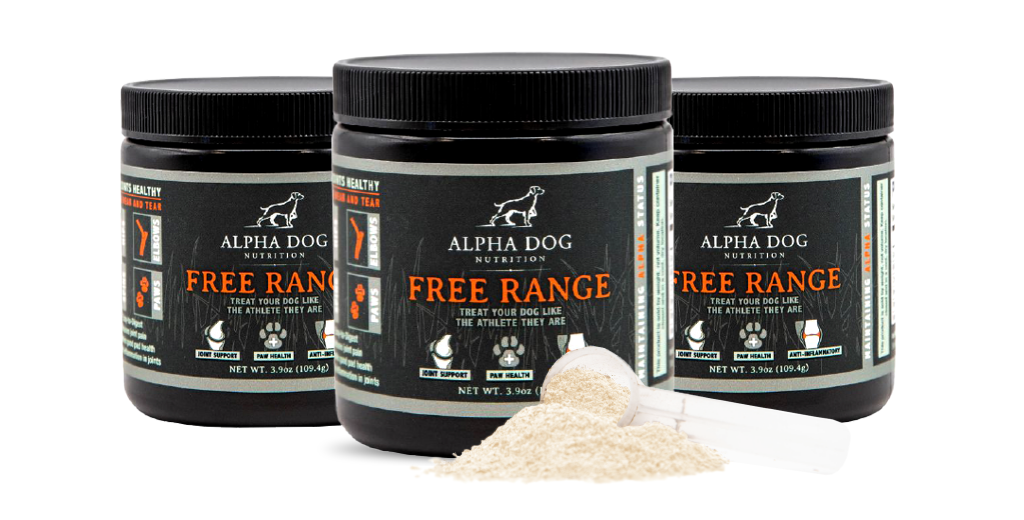Hip problems in dogs, such as hip dysplasia and arthritis, can significantly affect their quality of life.
These conditions often lead to pain, reduced mobility, and difficulty in performing everyday activities, such as walking or playing.
Understanding the causes of hip problems is essential for prevention and management.
In this post, we are going to explore five effective ways to support your dog’s hip health, starting with what causes hip problems in dogs.
Let’s dive in!
What Causes Hip Problems in Dogs?
Hip problems in dogs can arise from various factors:
- Genetics: Certain breeds, especially larger ones like German Shepherds and Golden Retrievers, are predisposed to hip dysplasia due to hereditary factors.
- Obesity: Excess weight puts additional stress on a dog’s joints, increasing the risk of hip issues.
- Age: As dogs age, wear and tear on their joints can lead to arthritis and other degenerative conditions.
- Injury: Trauma or injury to the hip joint can lead to chronic pain and mobility issues.
- Poor Nutrition: A lack of essential nutrients can affect bone and joint health, contributing to hip problems.
5 Ways to Support Hip Problems In Dogs
1. Take a Dog Joint Support Supplement
Joint support supplements often contain ingredients like glucosamine, chondroitin, and omega-3 fatty acids, which can help reduce inflammation, improve joint function, and support cartilage health.
These supplements are particularly beneficial for dogs with pre-existing hip issues or those at risk of developing joint problems.
Incorporate the supplement into their daily routine for optimal results, and monitor their response over time.
Out of all the joint support supplements my dog has tried, Alpha Dog’s Free Range Joint Support Powder is his personal favorite.
Alpha Dog’s Free Range Joint Support Powder is my dog’s favorite for hip discomfort because it combines high-quality ingredients like glucosamine, chondroitin, and MSM with the irresistible flavor of real beef liver.
This powerful formula not only helps manage painful conditions like arthritis and hip dysplasia but also supports overall joint health, allowing my dog to stay active and playful.
With no harmful additives, I can trust that I’m giving my furry friend the best nutrition for strong and healthy joints.
Simply follow the directions on the back and you’re good to go!
2. Maintain a Healthy Weight
Keeping your dog at a healthy weight is crucial for reducing stress on the hips and joints.
Obesity can exacerbate existing hip problems and increase the likelihood of developing new issues.
Feed your dog a balanced diet appropriate for their age, size, and activity level.
Regularly monitor their weight and adjust portion sizes as needed, ensuring they receive plenty of exercise to maintain a healthy body condition.
3. Provide Regular Exercise
The Role of Exercise
Regular, low-impact exercise can help strengthen the muscles around the hip joint and improve flexibility, which is essential for maintaining mobility and reducing pain.
Incorporate gentle activities such as walking, swimming, or playing fetch into your dog’s routine.
Aim for at least 30 minutes of moderate exercise each day, tailored to your dog’s abilities and limitations.
4. Create a Comfortable Living Environment
A comfortable living space can make a significant difference for dogs with hip problems.
Providing a supportive bed and minimizing stairs can help reduce strain on their joints.
Invest in a high-quality orthopedic dog bed that offers adequate support and cushioning.
Consider using ramps or pet stairs to help your dog access their favorite spots without jumping, which can exacerbate hip pain.
5. Work with Your Veterinarian
Regular check-ups with your veterinarian are essential for monitoring your dog’s hip health and addressing any emerging issues.
Your vet can offer personalized advice and treatment options tailored to your dog’s needs.
Schedule routine veterinary visits to assess your dog’s joint health, discuss any concerns, and explore various treatment options, including physical therapy or medications if necessary.
Maintaining open communication with your vet will ensure your dog receives the best possible care.
Support Your Dog’s Hip Problems
Supporting a dog with hip problems involves a comprehensive approach that includes joint supplements, weight management, regular exercise, a comfortable living environment, and professional veterinary care.
By implementing these strategies, you can help improve your dog’s mobility and overall quality of life.
Always consult with your veterinarian before making significant changes to your dog’s routine or treatment plan to ensure their specific needs are met.
With the right care and support, your furry friend can enjoy a happier, more active life.
Thank you for reading!

